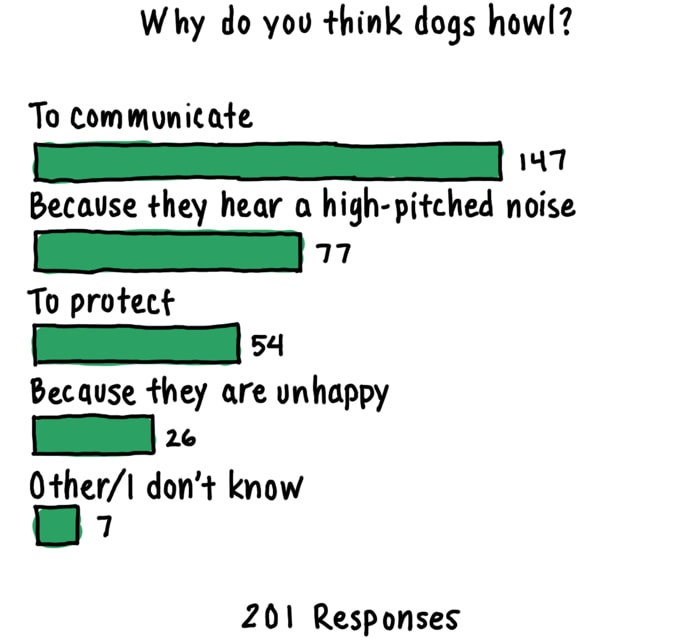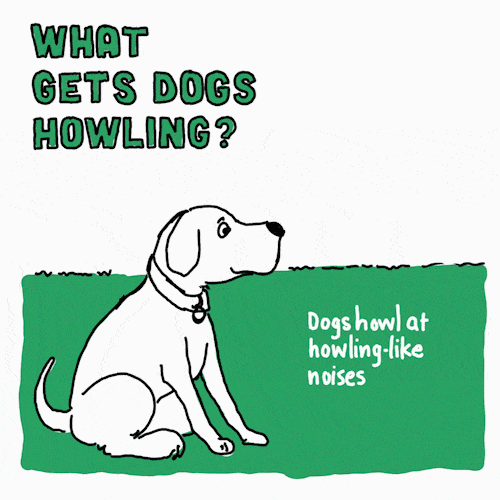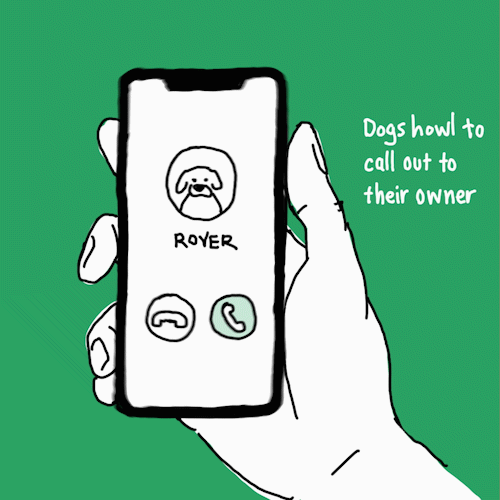

Every pet parent wants to know the meaning of dog howling. Now, we all know what howling sounds like - it’s a high-pitched sound that sounds like a doleful cry. However, many of us are still quite unaware of why do dogs howl. Well, here’s a fun fact: howling for dogs is genetic inheritance. It’s no news that dogs are closely related to wolves. Despite the difference in their sizes, wolves and dogs share around 99% DNA. However, heredity is not the only reason why dogs howl. So, what does it mean when a dog howls, and how can you handle your howling dog? You will find answers to such questions in this article.
To handle a howling dog, you first need to understand the reason why your pet is making this long, wailing noise. Here’s a look at some probable causes of dog howling.
Dogs feel stimulated by high-pitched sounds. Howling is their way of responding to fireworks, sirens, bells, and other noises. This type of howling starts as soon as they hear the shrill sound. As a pet owner, you don’t have to worry about this type of howling since it usually stops when the trigger sound does.
If a dog is excessively attached to you, they might experience separation anxiety. So, once your little companion learns that you won’t be around for a few days, they might start howling under stress and anxiety. If your dog howls every time you need to leave for a long period, it is a sign of hyper-attachment. You might have to treat their anxiety to manage this type of howling. And no, scolding them is not the right way of doing it.
A howling dog could also be seeking attention. And this type of dog howling can be bothersome. You might feel like scolding, questioning, or holding your furball, but you must do the exact opposite of it. Avoid giving your pet any type of attention. Don’t pamper or scold them.
Dogs can sense bad weather, earthquakes, diseases, and so much more. Hence, you cannot rule out the fact that a howling dog could also be trying to alert you of something. Maybe they feel a situation is not right for you or could cause you potential harm. Dogs can sense the intentions of a person through their facial expressions. That’s exactly why dogs howl at some people who try to get near you or your house.
Dogs are still very social animals; it’s just that now we are their pack. When they miss us, they will howl in hopes we respond. Dr. James Serpell, BSc, Ph.D., Professor of Humane Ethics & Animal Welfare at the University of Pennsylvania School of Veterinary Medicine, explains it this way: That [howling] is an attempt on the part of the dog to ask the owner, ‘Where are you so that I can rejoin you?’
Dr. James Serpell doesn’t believe so. “My own research has shown that it is common across breeds. People think huskies may be more prone to group howling.”
Dogs going through separation anxiety may howl excessively when left home alone. Dr. Jo Gale, BVetMed CertLAS MRCVS, Senior Manager for Global Science Advocacy at Waltham Petcare Science Institute, says, “If you reinforce quiet behavior, they are less likely to continue howling.” You can do this by quieting your dog and then leaving for a very brief time before returning and rewarding them when they stay quiet. Gradually increase the time you’re gone to reassure them you’ll always be back.
But what if your pawsome pet is howling due to other reasons? Let’s understand how to handle such situations:
As a pet parent, you must avoid reacting to the howling. This could encourage your dog to howl even more. If you avoid reacting, your dog will understand that howling won’t get their demands met. This might possibly work towards reducing this behaviour in the future.
Pamper your little companion when they do not howl on hearing a siren or bell. Give them attention and love when they are calm to encourage quiet behaviour. Always keep your pet’s favourite treats ready so you can let them know they have been a good boy or good girl by not howling.
If your pooch often reacts to high-pitched sounds, you can even get in touch with a dog trainer. They can work with your dog to change their response to triggering sounds like sirens and fireworks.
Note: Training your fur baby is a time-consuming process. Hence, stay consistent with the actions recommended above and your pet will learn to control their howling triggers.
If you're looking for the perfect dog for you, try our Dog Breed Selector today and enjoy a lifetime of tail-wagging joy.
To understand what a howling dog means to communicate, you need to first read the situation. When dogs howl, it could mean anything–a response to high-pitched sounds, an attempt to attract attention, a suspicion towards someone, etc.
Yes. Since dogs are genetically programmed to howl, it is okay to leave them alone when they do that. However, if it bothers your neighbours, you might want to learn to handle your fur baby or get professional help.
While howling sounds like a long cry, it doesn’t always mean that they are sad.
To stop your dog’s howling, you can reward their calm and quiet behaviour. If they are howling for attention, avoid reacting to it. If you need more help, you may want to reach out to a dog trainer.





Some dog parents encounter the challenge of dealing with a finicky eater, where their furry friend becomes selective or hesitant about their meals. Understanding the underlying reasons for this behaviour is crucial in ensuring the well-being and health of these cherished pets. In this article, we delve into the various factors that contribute to a dog's picky eating habits, exploring potential psychological, physiological, and environmental triggers.
Is your dog a picky eater? A dog's temporary loss of appetite can stem from various factors, including changes in the environment, mild illness, stress, or even the weather. While occasional appetite fluctuations are typical, prolonged refusal to eat can lead to serious health complications. It is essential for pet parents to pay close attention to their dog's eating habits, considering it as an indicator of their overall health. If a dog consistently refuses meals or shows disinterest in food, it is imperative to consult a veterinarian to rule out any underlying medical conditions.
According to veterinary experts, animal eating disorders are more common than people think. Anorexia in animals, defined as a loss of appetite, can manifest in two forms. The first kind involves a refusal to eat and is often linked to severe illness, and the other is where dogs want to eat but encounter difficulties in chewing, picking up, or swallowing food. In clinical settings, a diagnosis of anorexia is established when a dog consistently refuses to eat or displays a significant change in eating habits. The concern is heightened, particularly when a dog with a history of healthy eating habits suddenly loses interest in food.
A dog not eating properly can stem from various causes ranging from physical health to behavioural problems. Some of such reasons are listed below:
Some dogs prioritise attention or playtime over meals, leading to a lack of interest in food. Acknowledging their preferences and creating a relaxed feeding environment, such as feeding them in a quiet spot away from distractions, can promote healthier eating habits. Engaging in interactive play sessions or providing affectionate interactions before mealtime can also help stimulate their appetite and encourage a more positive association with food.
If a dog is a picky eater, it can be because it associates the food with past negative experiences, such as an upset stomach or digestive issues. Introducing alternative, more appealing food options that are gentle on their stomach can help dissociate negative memories and encourage a return to regular eating patterns. Gradually introducing these new foods alongside familiar ones can also help build their confidence and trust in trying different meals.
Dogs, like humans, can experience appetite loss due to various stressors, including separation anxiety, changes in routine, or environmental stressors like loud noises or unfamiliar surroundings. Creating a comforting environment by providing a cosy and safe space, along with soothing background noises or calming scents, can help alleviate stress and improve their eating habits.
A dog not eating food can be indicative of underlying health issues such as dental problems, digestive issues, or systemic illnesses. Regular check-ups and close monitoring of any changes in their eating behaviour are crucial for early detection and effective treatment. Observing other accompanying symptoms like lethargy, weight loss, or changes in bathroom habits can provide valuable information for the vet to conduct a thorough examination and diagnostic tests to identify any potential health concerns.
Dogs, like humans, can develop preferences for certain flavours or textures, leading them to reject their current food. Gradually introducing new food options guided by a veterinarian can help identify more appealing alternatives that align with their nutritional needs. Understanding their taste preferences and incorporating a balanced and varied diet that includes different protein sources and textures can not only stimulate their appetite but also ensure they receive essential nutrients for optimal health.
Overindulgence in treats can lead to a reduced appetite for regular meals, as dogs may fill up on treats and not feel the need to consume their main meals. Limiting the amount of treats given to only training sessions or as occasional rewards for good behaviour can encourage a healthier mealtime routine. Using healthier treat alternatives such as small pieces of fruits or vegetables can also provide added nutrients and prevent the negative effects of excessive treat consumption, promoting a more balanced diet overall.
Dogs can become bored with repetitive meal offerings, leading to a lack of interest in eating. Adding variety to their diet, such as incorporating canned food, meal toppers, or rotating different protein sources, can enhance meal appeal and stimulate their appetite. At IAMS, we offer a variety of dog food in different flavours that are not only yummy but also nutritious. With our Proactive Health dog food range, you can hit two birds with a stone – cater to the discerning taste of a finicky eater and meet its dietary needs.
Sharing human food with dogs can lead to overfeeding and disrupt their regular meal schedules, as they may fill up on extra calories and lose their appetite for their designated meals. Establishing clear boundaries and avoiding feeding table scraps can regulate their calorie intake and prevent unnecessary weight gain. Providing appropriate portion sizes based on their size and dietary requirements, along with a well-balanced diet, can help maintain their ideal weight and prevent any gastrointestinal discomfort caused by excessive or inappropriate human food consumption.
Dogs thrive on consistency and routine, and irregular meal schedules can disrupt their eating patterns and cause confusion. Establishing a fixed feeding schedule and offering meals at the same time each day, along with a designated feeding area, can reinforce a structured feeding routine that they can anticipate and rely on. Setting a specific time limit for meal consumption and removing any uneaten food after that period can prevent overeating and encourage them to finish their meals within the allocated time, promoting healthy and balanced eating habits.
Persistent appetite loss, despite various interventions, may indicate complex health concerns that require professional veterinary attention and diagnostic testing. Consulting a veterinarian for a complete assessment and tailored treatment plans is essential for identifying any underlying health issues affecting their appetite. Diagnostic procedures such as blood tests, imaging scans, or dietary trials may be recommended to pinpoint any physiological or medical factors contributing to their decreased appetite. With proper medical intervention and management, underlying health issues can be addressed effectively, ensuring their overall well-being, and restoring their normal eating patterns.
Keeping a close eye on your dog's eating habits is crucial for maintaining its overall health and well-being. Any significant changes in its appetite, such as sudden or prolonged refusal to eat, should not be overlooked, as it can indicate underlying health issues or emotional distress. Regular monitoring of its eating patterns, along with prompt veterinary consultation in case of continued appetite loss, can help identify and address any potential concerns early on. Maintaining a balanced diet, providing a stress-free environment, and ensuring a consistent feeding routine can contribute to their overall nutritional health and promote a positive relationship with food.
If your dog is a picky eater, navigating through its diet can be a challenge because of the various reasons associated with it. Understanding the possible causes can help you tailor your approach to encourage them to eat more consistently. It's essential to consider factors such as changes in their environment, health concerns, dietary preferences, or even behavioural issues that may be influencing their eating habits. Experimenting with different food textures and flavours, maintaining a stable feeding routine, and minimising stress during mealtime can help address a dog’s picky eating. Seeking guidance from a veterinarian or animal behaviourist can provide valuable insights and strategies to manage their selective eating habits effectively.
Understanding the intricacies of a dog's eating habits is vital for its overall well-being and health. Regular monitoring of its appetite, maintaining a balanced diet, and creating a stress-free feeding environment can contribute significantly to their nutritional health. Additionally, addressing any sudden changes in their eating behaviour promptly and seeking veterinary guidance when necessary is crucial for identifying underlying health issues or emotional distress. With a tailored approach that considers various factors influencing a dog’s eating habits, pet parents can effectively manage picky eating behaviours and ensure their beloved companions receive the necessary care and attention to maintain a healthy and fulfilling lifestyle.